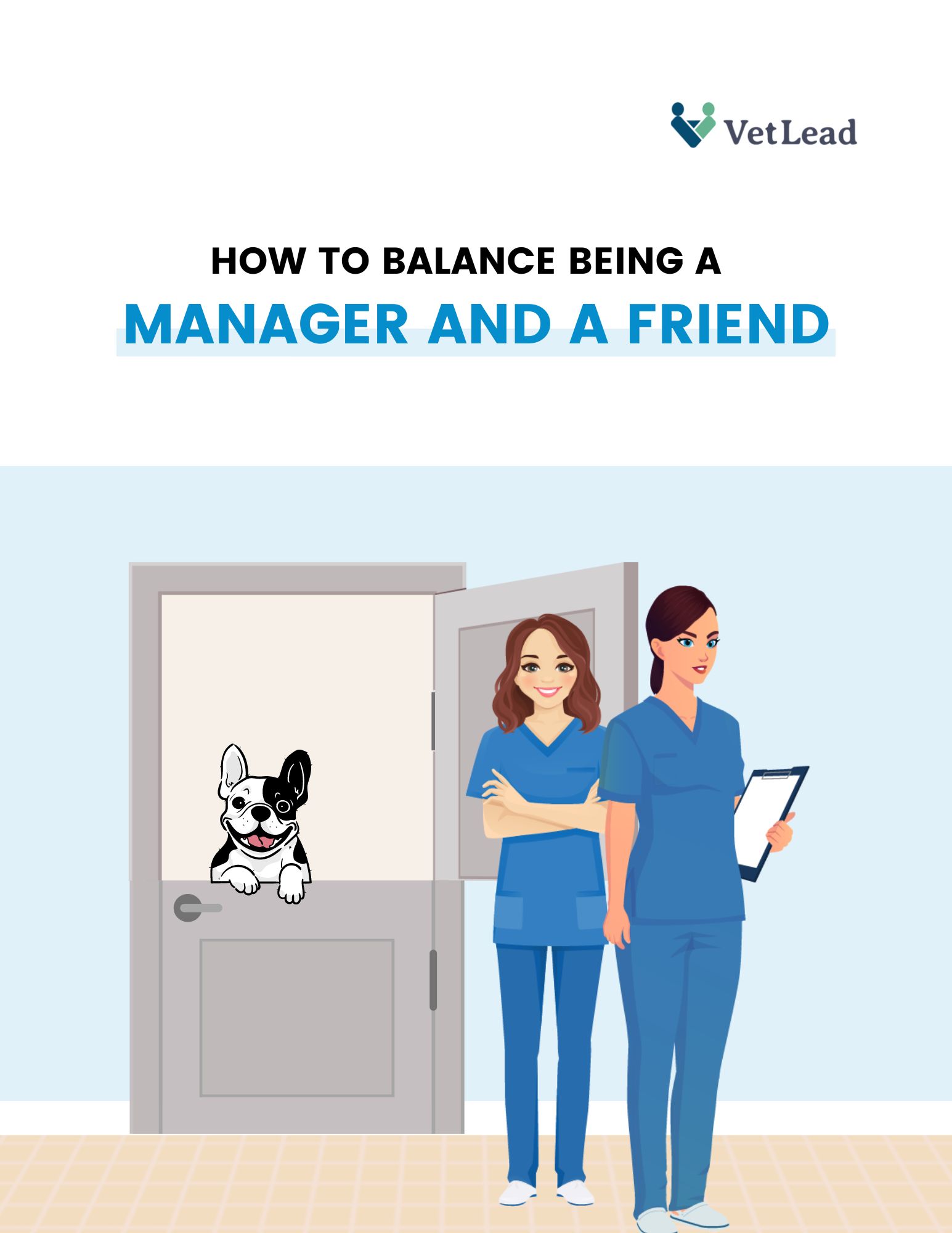Navigating the complexities of leadership within a veterinary team can often feel like walking a tightrope. It's not uncommon for me to hear sentiments like, "I can't be their friend; I have to be their boss." This belief that friendship and leadership are mutually exclusive is a misconception that many veterinary professionals struggle with, especially when someone transitions from colleague to supervisor.
The dynamics shift when a friend becomes a boss. Suddenly, the casual interactions of the past are replaced by a hierarchical structure, where one person holds authority over the other. This can create a sense of unease, both for the new leader and for the team.
However, this perceived dilemma is a trap. It's entirely possible to have genuine friendships within your team while maintaining a strong leadership presence. You don't have to sacrifice your personal connections to be an effective leader. In fact, having authentic relationships can enhance your ability to inspire, motivate, and guide your team towards success.
Friendship and Leadership Can Go Hand in Hand
What qualities define a good leader in your mind? Do you envision someone who supports and develops their team, providing guidance and feedback to help them achieve their full potential? Someone who fosters a positive and collaborative work environment, where everyone feels valued and empowered?
If so, you're not alone. These are the same qualities we often seek in our friends.
The truth is, many of the skills and qualities that make a great leader also make a great friend. Being honest about performance, clarifying expectations, and challenging your team to continuously improve can strengthen both friendships and professional relationships.
So, the question isn't whether you can be a friend and a supervisor. It's how you can have authentic relationships while supporting a collaborative, and high-performing team.
The Challenges of Leading Friends
Being a friend and a boss isn't always easy. Difficult situations can arise when you need to address underperformance, make tough decisions, or deliver unpleasant news to someone you care about. These conversations can be uncomfortable, but avoiding them isn't the answer.
Approach these situations with honesty and a focus on your friend's best interests. Remember, you're not just their friend; you're also their leader, responsible for their professional growth and the success of the practice.
It’s important to establish clear boundaries and expectations from the outset. Openly communicate with your friends about the dual nature of your relationship and the potential challenges that may arise. By addressing these issues proactively, you can build trust and maintain a healthy working relationship that benefits both of you.
Tough Conversations Aren't Exclusive to Friendships
The true challenge lies in mastering difficult conversations, regardless of the relationship. This applies to interactions with practice owners, fellow veterinarians, colleagues, friends, and even family members.
These conversations are never easy, but they don't require sacrificing relationships within your team. In fact, wouldn't you prefer to receive challenging news from someone who genuinely cares about your success and well-being?
Addressing the Perception of Favoritism
A common concern among veterinary leaders who supervise friends is the perception of favoritism. It's natural to connect more easily with some team members than others, and this can sometimes lead to unintentional biases or misunderstandings.

However, in many cases, the opposite is true. It’s not uncommon for managers to hold their friends to even higher standards, pushing them to excel and challenging them to reach their full potential. This isn't about favoritism; it's about recognizing and nurturing the unique strengths and talents of each individual.
Of course, there are situations where personal relationships can be exploited. If a friend tries to take advantage of their connection with you, it's important to address the issue directly and professionally. Open communication, clear boundaries, and a commitment to fairness are essential for maintaining a healthy and productive work environment.
How to Lead Friends in Your Veterinary Practice
You have a choice: Become a leader who thrives with friends at work, or eliminate those friendships altogether. Both options present challenges, but having friends can make you a more engaged and fulfilled leader.
Here are some strategies to successfully navigate the complexities of leading friends:
1. Establish Clear Boundaries
When close friends become team members, have an open and honest conversation about the dynamics of your dual relationship. Emphasize that while your friendship is valued, professional boundaries must be maintained to ensure fairness, avoid conflicts of interest, and protect the team's overall success.
2. Champion Equal Support and Development
As a veterinary leader, it's essential to provide consistent coaching and support to every member of your team, regardless of their current performance level. Everyone deserves the opportunity to grow and develop, and equitable access to resources and feedback fosters a culture of trust and fairness.
Avoid the trap of focusing solely on high performers or struggling individuals. By investing in the growth of each team member, you create a more cohesive, motivated, and high-performing team overall. This not only benefits individual employees but also contributes to the overall success of the practice.
3. Cultivate Inclusive Social Connections
If your veterinary practice has a social culture, ensure that all team members are invited to events. During these gatherings, intentionally connect with different individuals, fostering a sense of belonging and camaraderie across the team. Team events offer valuable opportunities to strengthen bonds, deepen understanding, and learn more about your team members' personalities and interests.
4. Maintain Transparency and Fairness in Decision-Making
As a leader, it's crucial to regularly check your biases and ensure that work assignments, compensation, and promotions are based on objective criteria and performance, not personal relationships. Implementing a transparent and consistent process for these decisions eliminates any perception of favoritism and fosters a sense of equity and trust within the team. Remember, a clear and fair system benefits everyone, regardless of personal connections.
Conclusion
Leading friends in the veterinary workplace doesn't have to be a daunting challenge. By embracing the strategies outlined above, you can cultivate a thriving practice culture where strong leadership and genuine friendships coexist.
Remember, we're all human, and connection is essential for a fulfilling work experience. Don't let the fear of blurring lines deter you from building authentic relationships with your team. Instead, learn to navigate the complexities with grace, empathy, and open communication.
When leaders and team members alike feel valued, supported, and empowered, the entire practice benefits. You'll see increased engagement, improved collaboration, and ultimately, a more successful and fulfilling veterinary practice.

Download This Free Resource Now
We don't share or sell your information.
Prefer not to share your email? Get the PDF here.
Have you struggled with managing friends in your practice? Share your story in the comments below.